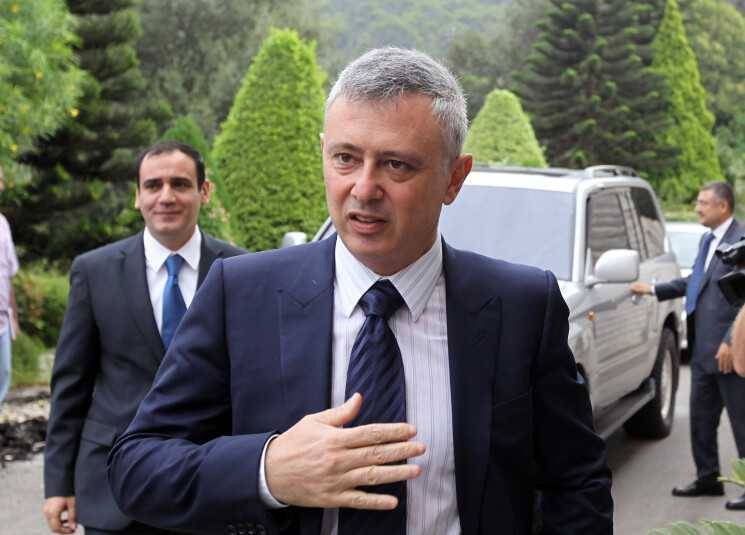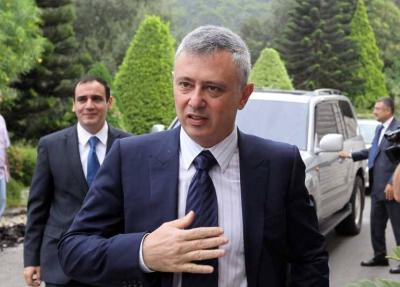If the discussion regarding the government file has become part of the past in light of the lack of efforts and the acceptance of the caretaker government's continuation until the end of the term, it is also understood that the battle for the presidency has opened prematurely to avoid a presidential vacuum in the absence of an authentic government and in response to external calls that continually urge respect for the deadlines of constitutional entitlements, the latest of which was stated by US Ambassador Dorothy Shea yesterday, as well as fulfilling the wishes of the head of the Maronite Church primarily concerned with the presidential entitlement, which was echoed by Speaker of the House Nabih Berri announcing the first session to elect a president at the beginning of next September.
While Lebanese Forces Party leader Samir Geagea opened the presidential season with his remarks to "Al-Markazia" two weeks ago, coinciding with Hezbollah Secretary-General Hassan Nasrallah's position supporting one of the natural candidates, and the announcement by Free Patriotic Movement leader MP Gebran Bassil that if he is not a president, he could be a maker of a president, the head of the Marada Movement, Sleiman Frangieh, visited Diman a week ago and met with Cardinal Mar Bechara Boutros Al-Rahi, at the same time as the problematic detention of Bishop Moussa Al-Hajj. However, the main focus of the meeting was distinctly presidential, where he candidly stated, "I did not propose myself as a candidate for the presidency but I am being proposed," clarifying in response to a question about whether he meets the qualifications of the president that "the patriarch did not say otherwise to me, and I am open, moderate, and a man of dialogue, but I have my political stance."
The factors that governed the presidency in 2016 have changed entirely, and the circumstances that brought President Michel Aoun to Baabda are no longer present. So, will Frangieh be the candidate of the resistance team while being fully aware that the stage requires a unifying, not divisive, president—one who desperately needs Christian cover that is politically unavailable from the two largest Christian blocs, the "Strong Republic" and "Lebanon Strong," and is thus betting on the blessing of the patriarchate? And what about the Shiite duo, the Sunnis, and the Druze, represented by Progressive Socialist Party leader Walid Jumblatt, who spoke about the need for a new Elias Sarkis? And also, and most importantly, what about the stance of the outside world from Washington to Paris, and from Cairo to Tehran and Damascus?
These calculations are well understood by Frangieh, and it is likely that he is studying them with precision and care in coordination with the Speaker of the House, who received him yesterday and discussed the matter from all its aspects, especially regarding Hezbollah's endorsement of his candidacy or not, while waiting for regional data to crystallize that will directly impact the Lebanese presidential entitlement and the personality that the opposition team and the change MPs might settle on if they do. However, the northern leader seems determined to engage in the entitlement; otherwise, he would not have opened his door. Here, informed political sources ask through "Al-Markazia" whether the man is acting with his usual spontaneity and impulsiveness, or if there is someone providing him with support and paving the way to Baabda Palace. And if he indeed has such support, what about securing the quorum that requires the presence of 86 MPs to commence the parliamentary session for the presidential election, and what about the position of the Christian parliamentary blocs that do not seem to support him, at least so far, despite "Lebanon Strong" complying with "an order of loyalty"? Is it conceivable that he could gain the support of the Lebanese Forces, which seems like a fantasy?
There are many questions and the answers are not known at this moment, but it is certain that Frangieh is laying the groundwork both domestically and externally to achieve his dream of sitting in Baabda, especially since betting on the unification of the opposition is not encouraging, and the arrival of his rival Gebran Bassil seems almost impossible, alongside regional and international developments that may benefit him. So, could Frangieh be the Elias Sarkis of 2022, rescuing the country?




